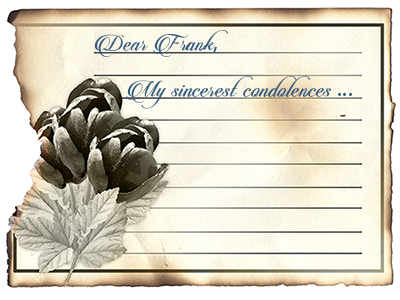 My colleague, Frank, seemed distracted. He was taking days to respond to emails and ignoring voicemails altogether. Then I received this bombshell of an email from him:
My colleague, Frank, seemed distracted. He was taking days to respond to emails and ignoring voicemails altogether. Then I received this bombshell of an email from him:
Dear Leslie, I’m in Massachusetts. My sister, who had lung cancer, passed away yesterday. I’ll be back at work next Monday. Regards, Frank
My heart fell. At first, I felt ashamed for having asked Frank niggling questions about the tedious tasks of everyday work life. Then I felt true sadness for him and his family. And finally, I’ll confess, I thought, “I need to write Frank a note, but what do I say at a time like this?”
Sometimes we’re aware a colleague has a seriously ill or elderly family member who may be close to death. But mostly, the death of a colleague’s loved one is unexpected. And with this unplanned jolt of sadness comes the responsibility—and desire—to let your colleague know you’re thinking about them with sympathy. Thus, the dreaded task: writing a condolence.
Why are condolences so hard to write? Why do we struggle to write a simple message? Well, it’s not easy to write eloquently when we’re feeling sad. We know our colleague is suffering, and we want to find the words that will relieve the grief just a little. Responding to a death is deeply personal, and sometimes we’re afraid to walk over a line that could be better left uncrossed.
Responding to a death is deeply personal, and sometimes we’re afraid to walk over a line that could be better left uncrossed.
Even if the condolence is difficult for you to write, you should still do it. “I don’t know what to say, so I won’t say anything,” doesn’t cut it. Take a deep breath and follow these writing tips. You’ll maintain your self-respect, and you’ll give comfort to a person who needs it.
- Share a memory. If you knew the person who died, or your colleague has talked to you about his loved one, share a memory in your condolence. Make it simple, specific, and upbeat. You could write, “I enjoyed meeting Laura when she came to our office last year to pick you up after work,” or “You often told me how much fun you and Jerry had at summer camp when you were kids.”
- Make a specific offer of help or companionship. Don’t write, “If there’s anything I can do, please let me know,” because it puts the responsibility on the bereaved colleague. Instead, write, “Could I bring dinner over? I’ll email you next Monday to ask when would be a good day,” or “Would you like to go for a walk after work next week? I’ll stop by to ask which day might work for you.”
- Send a card. It’s fine to reach out with an email or text that acknowledges the colleague’s loss and offers a few words of sympathy. But you should dignify your condolence, and honor your colleague, by sending an actual card. In an envelope. With a stamp. Think of your electronic condolence as temporary and get the card in the mail quickly.
- Share a quotation. If your own words of sympathy won’t come, you may be able to find a meaningful quotation. Look online at resources such as Bartleby or ObituariesHelp.org. In my condolence to Frank, I included this beautiful line from Emily Dickinson: “Unable are the loved to die. For love is immortality.”
- Avoid I language. Don’t write, “I cannot imagine what you are going through,” or “I don’t know what to say.” It’s about the bereaved person, not about you.
Writing a condolence isn’t easy, but don’t be so afraid of writing the wrong thing that you write nothing at all. If your message of condolence is sincere, it will provide genuine comfort.
Tags: Plain language, Tone, Workplace Writing






0 Comments
Trackbacks/Pingbacks